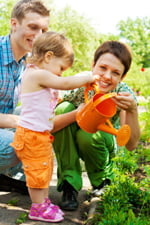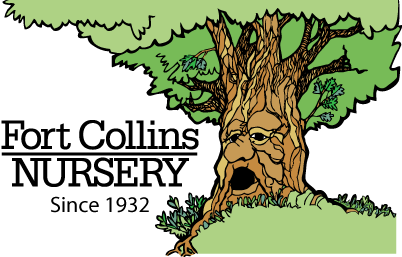 I recently polled the Nursery’s Facebook fans on what they wanted to see in this article, and the most popular topic was gardening for kids. Now, I find myself trying to be the “expert” on the subject, but I have no children of my own. So, instead of trying to pretend like I know what I’m talking about, I conducted a few interviews of my own and consolidated the responses below:
I recently polled the Nursery’s Facebook fans on what they wanted to see in this article, and the most popular topic was gardening for kids. Now, I find myself trying to be the “expert” on the subject, but I have no children of my own. So, instead of trying to pretend like I know what I’m talking about, I conducted a few interviews of my own and consolidated the responses below:
My first interviewee was Sarah Barber, the 12-year-old daughter of Connie, one of our office administrators here at Fort Collins Nursery. Sarah says she helps her parents in their garden with tasks such as watering and weeding. One task she particularly enjoys is taking the plants out of their pots and helping get them planted in the ground.
She says she gives a fair amount of input into what goes into the garden, too. “I will tell my parents ‘We should plant this one’ and they usually will say ‘OK’ unless it’s a plant that won’t do well in our yard.” I asked Sarah what criteria she uses for choosing plants, and for her, it’s all about looks. “I like flowers better than vegetables, because they are pretty when they bloom, and they are a lot easier to plant than trees.”
Sarah has some advice for parents based on one of her childhood memories. “I remember when I was little we had a beautiful flower bed but it was too close to a swing I really like. My parents took the swing down because I kept walking through the flowers to get to the swing. I was pretty upset at them”
Verdict? Don’t let gardening interfere with fun. Also, in Sarah’s opinion, kids will happily help if parents ask, but only if parents understand the difference between asking and telling.
Next I interviewed Scott Swartzendruber, Fort Collins Nursery’s Nursery Stock Buyer and father of two young ladies, Iris, age 3, and Ruby, age 8. Scott’s daughters take gardening pretty seriously, so it was no surprise to learn that he gets in trouble if he forgets to include them in any of his gardening projects. Ruby and Iris help with everything from weeding, watering, pruning, planting and harvesting. They even get an area of the garden where they call all the shots.
Scott says that the most important part of the process of keeping his daughters involved is letting them have meaningful input. By letting them choose plants, put them in the ground, and care for them, “they get emotionally tied to everything. They even give names to each individual plant.” Ruby and Iris are currently working on “Name Gardens” where they choose plants that bear their own names (Iris likes iris, and Ruby is excited about the Miss Ruby Butterfly Bush).
Again, we see that getting input from kids is crucial to their enjoyment in the garden. Kids don’t like to be slaves, but they are happy to work hard when they feel invested in the project.
Finally, I interviewed several customers who were shopping with young children.
Veleria was shopping with her two young grandsons, Blake and Tanner. They help in all aspects of work on their grandmother’s ranch, including mowing and weed-eating. Blake says he looks forward to running the ranch when he’s old enough. Tanner told me the last gardening project he did was to plant flowers around some of his grandmother’s trees as a birthday gift.
Brad and his 4-year-old granddaughter Rhya told me about their vegetable garden. Rhya helped choose almost all the vegetables they are growing in their garden this year, but the one she was most excited about was the pumpkin, “A really big pumpkin!” Brad says, “I think it’s neat, showing [children] how things grow.” Kids who are excited to learn are great in the garden, because that thirst for knowledge keeps them interested in the lifecycle of the plants.
After meeting so many people with so many perspectives, I’ve drawn a few conclusions:
- Children want input. Don’t worry, you’re probably still the plant expert, but it’s important to give them choices. You may think tomatoes are the most fun plants in the world (I certainly do), but unless your kids can be convinced, they won’t be too excited about helping in the veggie garden. If they like flowers, give them a flower garden and make them responsible for providing beautiful bouquets to brighten the home.
- Along similar lines, ask kindly for their help rather than making gardening a non-negotiable chore. Your children’s time in the garden needs to be fun, and it can’t take the place of something they value more highly. You might even consider easing them into gardening by setting up a reward system (30 minutes of gardening earns 30 minutes of cartoons?)
- Make gardening an exploratory learning experience. There are plenty of life lessons that can be learned among the plants, and those lessons can help keep kids motivated. Focus on the accessible aspects – the sights, smells, textures, tastes and sounds of the insects, flowers, fruits and vegetables they encounter. Try explaining plant cell biology, though, and watch their eyes glaze over.
- Choose easy plants with big impact and excitement. Annuals are colorful and grow fast, and veggies are fun and tasty. However, I’ll be impressed if you have a youngster who finds ornamental grasses thrilling or who has the patience to wait for a slow-growing mugo pine.
- Remember that you’re the model for your children. Show them how much you love what you’re doing, and they’ll catch the wave of enthusiasm. Share stories from your own experiences. Go to the library and find age-appropriate, beautiful books that imaginatively open up the natural world. Invite their friends to participate in your family gardening activities.
Although I have no children, I know how powerful childhood gardening memories can be, since many of those memories inform my life today. I remember hearing about how the bees ‘kiss’ each flower ‘good morning’; I have an enduring love and respect for our pollinating friends. I remember having a great time getting dirty while digging in the soil and playing with the earthworms; I’ve never forgotten that what goes on below the surface is as important as what we see above-ground. I remember splashing around in puddles and ‘fishing’ in them after rainstorms; I continue to revel in the earth’s joy after a good, soaking rain. I remember picking up plant debris after an intense windstorm; I know that life is unpredictable and that none of us is really in control, although we try to be. Working in the soil is a learning experience for gardeners of all ages.
Have a great season!
Originally Published June 2011
Originally published on May 2nd, 2018. Updated on September 3rd, 2019.
